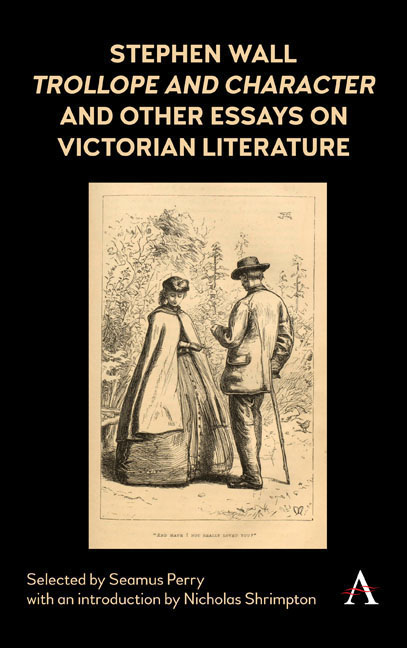Book contents
- Frontmatter
- Contents
- Preface
- Introduction: Stephen Wall and Trollope
- Part 1 On Trollope
- Part 2 On Dickens and Others
- 3 [George Eliot and Her Readers] [1965]
- 4 Jane Austen's Judgments [1968]
- 5 Dickens: New Words and Old Opinions [1969]
- 6 [Dickens and His Readers] [1970]
- 7 Dickens in 1970 [1971]
- 8 Annotated English Novels? [1982]
- 9 Affective Intentions [1985]
- 10 Virtuoso Variations [1987]
- 11 Going Beyond the Repertory [1990]
- 12 A Little Local Irritation [1998]
- Index
5 - Dickens: New Words and Old Opinions [1969]
from Part 2 - On Dickens and Others
Published online by Cambridge University Press: 25 July 2018
- Frontmatter
- Contents
- Preface
- Introduction: Stephen Wall and Trollope
- Part 1 On Trollope
- Part 2 On Dickens and Others
- 3 [George Eliot and Her Readers] [1965]
- 4 Jane Austen's Judgments [1968]
- 5 Dickens: New Words and Old Opinions [1969]
- 6 [Dickens and His Readers] [1970]
- 7 Dickens in 1970 [1971]
- 8 Annotated English Novels? [1982]
- 9 Affective Intentions [1985]
- 10 Virtuoso Variations [1987]
- 11 Going Beyond the Repertory [1990]
- 12 A Little Local Irritation [1998]
- Index
Summary
Next June Charles Dickens will have been dead for a hundred years, and we can expect that the anniversary will not go unnoticed by the publishers. But then most recent years have landed a formidable haul of books and articles about Dickens, and the volumes under review demonstrate the variable quality of this ever- increasing catch.
With Dickens, as with many other nineteenth- century writers, what is currently needed is fewer critical studies and more scholarly materials. The Clarendon edition of his novels and the Pilgrim edition of his letters are under way, but there is certainly room for such enterprises as Professor Harry Stone's edition of Dickens's uncollected writings from Household Words. In fact, the 78 extracts from the weekly periodical that Dickens ran from 1850 to 1859 are mostly only partly by him, but it is useful to have them all the same.
As has long been known, and as Professor Stone reminds us, Dickens was an intensely active and authoritarian editor. ‘He shaped each issue’ of Household Words, and he revised its contents so extensively that there is often no way of telling which words are his, except by what Mr Stone justly calls the compelling testimony of style. But those articles in which Dickens's share was substantial were recorded as being partly by him in the contributors’ book of Household Words (now at Princeton), and it is mostly these items – never included by Dickens in editions of his works – which Mr Stone has now collected.
In the sometimes unnecessarily repetitive headnotes, the editor indicates, on the basis of evidence or conjecture, which bits of each piece are by Dickens. The reader sometimes comes across passages in which the Dickensian note is so unmistakeable that he hardly needs editorial confirmation:
[In the Central Money- order Office:] Greasy butchers and salesmen from Newgate Market with bits of suet in their hair, who loll, and lounge, and cool their foreheads against the grating, like a good humoured sort of Bears….
[On ‘our first oyster’:] We feel it slipping down our throat now, like a sort of maritime castor- oil.
There are, too, some more extended passages of Dickens's writing at its most dazzling: the description of the posting of newspapers at St Martin's- le- Grand is particularly remarkable.
- Type
- Chapter
- Information
- Publisher: Anthem PressPrint publication year: 2018



